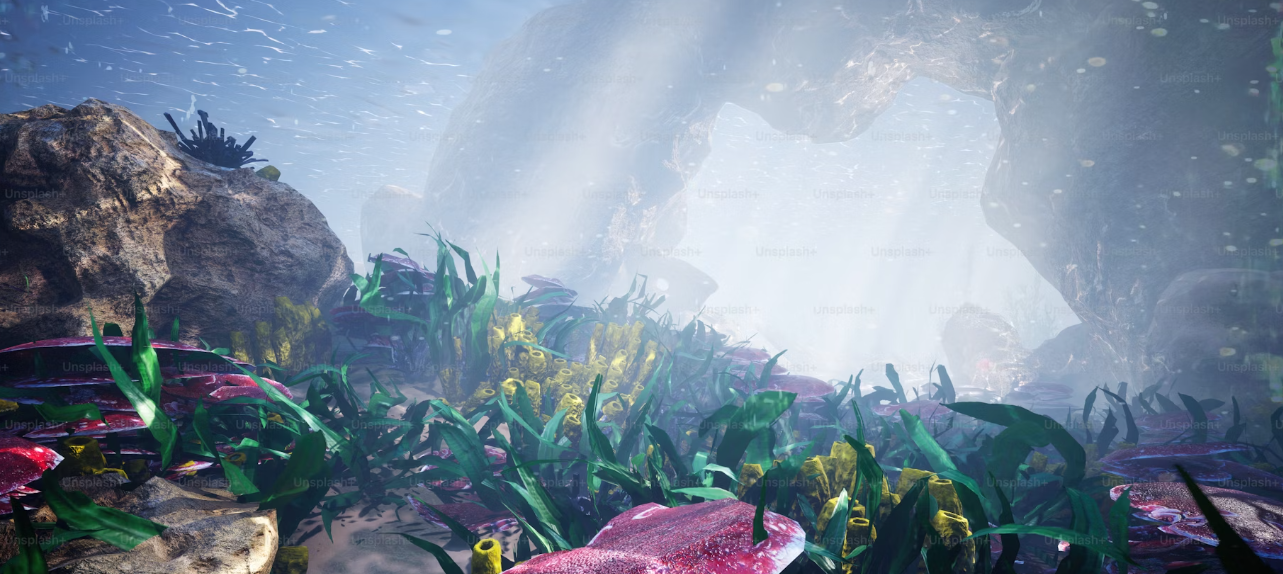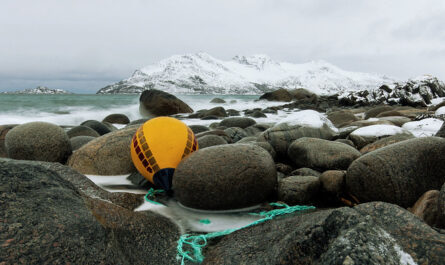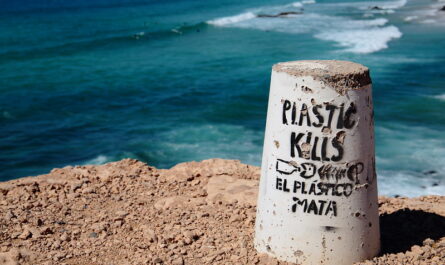The Atlantic Ocean, a vast and dynamic body of water, is home to an extraordinary array of marine life—from the tiniest plankton to the majestic blue whale. Yet this vital ecosystem is now under unprecedented threat from climate change. Rising sea temperatures, ocean acidification, and shifting currents are all transforming the Atlantic in ways that have profound consequences for its biodiversity and for the human communities that rely on its resources. As global temperatures continue to rise, the delicate balance of the Atlantic’s ecosystems is being disrupted, placing marine life under increasing pressure and reshaping the ocean as we have known it for millennia.
The Atlantic Ocean: A Vital Ecosystem
Spanning over 106 million square kilometers, the Atlantic Ocean connects the Americas to Europe and Africa. It is not only a route for international trade and travel but also a critical component of Earth’s climate system. By regulating weather patterns, absorbing significant amounts of carbon dioxide, and serving as a vast reservoir of life, the Atlantic plays a key role in sustaining our planet’s environmental equilibrium.
The ocean’s ecosystems are diverse and interconnected, including vibrant coral reefs, expansive seagrass beds, deep-sea habitats, and the open-water pelagic zones. Each habitat supports a unique community of organisms that contribute to the overall health and functionality of the Atlantic. Tiny phytoplankton form the base of the food web, while large predators—such as sharks, tuna, and marine mammals—help regulate species populations. Iconic species such as the North Atlantic right whale, loggerhead turtle, and Atlantic puffin depend on these balanced ecosystems for survival. However, the impacts of climate change threaten to upset this delicate balance, leaving marine life increasingly vulnerable.
Rising Sea Temperatures: A Warming Ocean
One of the most significant consequences of climate change on the Atlantic is the persistent rise in sea temperatures. Over the past century, the ocean has absorbed more than 90% of the excess heat generated by greenhouse gas emissions. This warming trend is not only a statistical anomaly; it is actively reshaping the distribution and behavior of marine species across the Atlantic.
Shifts in Species Distribution
As sea temperatures climb, many marine species are compelled to move in search of cooler waters. Traditional habitats for species like cod and haddock are shifting northward as these fish follow their preferred temperature ranges. This migration disrupts established food webs and challenges the traditional fisheries that coastal communities have depended on for generations. In regions where fish stocks once thrived, local economies now face uncertainty as fishermen travel farther or target new species that may not be as abundant or commercially valuable.
Conversely, warm-water species, including various types of jellyfish and certain plankton, are expanding their ranges into areas that were once too cool for their survival. This new competition can have cascading effects on the entire ecosystem. For instance, the increased presence of jellyfish in some regions has been linked to declines in fish populations, as these gelatinous creatures compete for the same food resources. The resulting shifts in the food web can lead to unforeseen consequences for both marine and human communities.
Coral Bleaching and Reef Degradation
Coral reefs, which rank among the most biodiverse ecosystems in the Atlantic, are particularly sensitive to temperature changes. When water temperatures exceed a critical threshold, corals become stressed and expel the symbiotic algae (zooxanthellae) that provide them with essential nutrients and vibrant color—a process known as coral bleaching. Without these algae, corals turn white and are left vulnerable to disease and mortality.
Recent years have seen widespread bleaching events in the Caribbean and off the coast of Brazil, where once-thriving coral reefs have experienced significant degradation. The loss of these coral ecosystems not only diminishes local biodiversity but also reduces coastal protection. Coral reefs act as natural barriers against storm surges and coastal erosion, and their decline has severe implications for communities that rely on them for tourism and fisheries.
Ocean Acidification: A Silent and Pervasive Threat
In parallel with rising temperatures, ocean acidification is emerging as a silent yet equally dangerous threat to the Atlantic Ocean. The process is driven by the absorption of excess carbon dioxide (CO₂) from the atmosphere. When CO₂ dissolves in seawater, it forms carbonic acid, which lowers the pH of the water and reduces the availability of carbonate ions—essential building blocks for the shells and skeletons of many marine organisms.
Impacts on Shell-Building Organisms
Shell-building organisms, including oysters, clams, and many planktonic species, rely on carbonate ions to construct their protective exoskeletons. As the ocean becomes more acidic, the chemical process of calcification is hindered, making it increasingly difficult for these species to grow and maintain their shells. In severe cases, existing shells can even begin to dissolve, leaving organisms defenseless against predators and environmental stressors.
Pteropods, tiny planktonic snails that serve as a crucial food source for larger species such as fish and whales, are particularly susceptible to acidification. The decline of pteropod populations can trigger a domino effect through the food chain, leading to reduced survival rates for the species that depend on them and altering the overall productivity of marine ecosystems.
Coral Reefs and Structural Integrity
Coral reefs face a double-edged sword: they are threatened by both warming waters and acidifying oceans. Acidic conditions weaken the calcium carbonate framework that is fundamental to coral structure. This reduction in structural integrity not only makes coral reefs more prone to erosion but also limits their capacity to recover from bleaching events. The combined stressors of heat and acidification are pushing many Atlantic coral reefs to the brink, potentially leading to long-term ecosystem collapse.
Changing Ocean Currents: Disrupting the Flow of Life
The Atlantic Ocean is defined by its powerful currents, including the famous Gulf Stream, which transports warm water from the tropics to the North Atlantic. These currents are integral to regulating the Earth’s climate and distributing nutrients that fuel the growth of phytoplankton—the foundation of the marine food web. However, climate change is altering the strength, direction, and timing of these ocean currents, with significant implications for marine life.
The Gulf Stream and Climate Regulation
The Gulf Stream is a vital component of the Atlantic’s climate system. It not only moderates temperatures along the eastern coast of North America and across Europe but also helps distribute nutrients and oxygen throughout the ocean. Recent studies indicate that the Gulf Stream may be weakening, a phenomenon attributed to melting Arctic ice and shifts in ocean salinity. A slowdown of the Gulf Stream could lead to cooler temperatures in Europe, altered precipitation patterns, and widespread disruptions in marine ecosystems.
Nutrient Distribution and Upwelling
Ocean currents facilitate the process of upwelling, where deep, nutrient-rich waters are brought to the surface. This process is critical for the growth of phytoplankton and, by extension, the entire marine food web. Changes in current patterns can reduce the frequency and intensity of upwelling events, leading to lower phytoplankton productivity. Without this vital base of the food chain, populations of fish, marine mammals, and seabirds could decline, ultimately impacting the entire ecosystem.
Impacts on Iconic Species
The cascading effects of rising temperatures, acidification, and shifting currents are not limited to microscopic organisms; they also extend to some of the Atlantic Ocean’s most iconic and vulnerable species.
North Atlantic Right Whales
The North Atlantic right whale is one of the world’s most endangered marine mammals, and its survival is being further jeopardized by climate change. As warming waters cause the distribution of their primary prey—tiny copepods—to shift, right whales are forced to travel farther in search of food. This extended movement increases their exposure to threats such as ship strikes and entanglement in fishing gear. The already precarious survival of these majestic creatures is compounded by the challenges posed by a changing climate.
Seabirds and Shifting Prey Dynamics
Seabirds, including the beloved Atlantic puffin, rely on stable fish populations to feed their chicks and sustain their colonies. Rising sea temperatures and shifting prey distributions have led to a decline in available fish stocks, forcing seabirds to travel longer distances to find food. This increased energy expenditure often results in reduced breeding success and lower survival rates, further endangering populations that are already under stress from habitat loss and pollution.
Fish and Invertebrate Communities
Many commercially important fish species, such as cod, haddock, and various types of tuna, are shifting their ranges in response to warming waters. These movements disrupt established fisheries and have economic ramifications for coastal communities. Invertebrate communities, including those that form the basis of many benthic ecosystems, are also experiencing shifts in distribution and abundance, altering the delicate balance of predator and prey relationships across the Atlantic.
The Human Cost of a Changing Ocean
The impacts of climate change on the Atlantic Ocean extend far beyond ecological disruption—they also have profound implications for human societies. Millions of people depend on the ocean for food, livelihoods, and cultural heritage, and the changing dynamics of marine ecosystems pose significant challenges for these communities.
Fisheries and Food Security
Fisheries in the Atlantic are a critical source of nutrition and income for coastal populations. As fish populations migrate in search of cooler waters, traditional fishing grounds become less reliable. This shift forces fishers to travel further or adapt by targeting new species, often with lower commercial value. The uncertainty and reduced productivity of fisheries threaten food security and the economic stability of communities that have relied on these resources for generations.
Coastal Protection and Economic Stability
Marine ecosystems such as coral reefs, mangroves, and seagrass beds provide natural coastal protection by buffering shorelines from storms, erosion, and rising sea levels. As these habitats degrade due to climate stressors, coastal communities become more vulnerable to extreme weather events and economic disruption. Tourism, a major industry in many Atlantic regions, also suffers when iconic landscapes and vibrant underwater environments are lost or degraded. The decline in ecosystem health directly translates into economic losses and increased vulnerability for those living along the coast.
Cultural and Social Impacts
For many coastal communities, the ocean is not merely an economic resource—it is a cornerstone of cultural identity and tradition. Changes in marine ecosystems can disrupt long-standing cultural practices, diminish community cohesion, and alter the way of life that has been passed down through generations. As climate change reshapes the Atlantic, communities face the dual challenge of adapting their economies while preserving their cultural heritage.
A Call to Action: Protecting the Atlantic Ocean
The challenges posed by climate change to the Atlantic Ocean are immense, but they are not insurmountable. Addressing these issues requires urgent, coordinated action at local, national, and global levels. Here are several key strategies to protect this vital ecosystem:
Reducing Greenhouse Gas Emissions
At the heart of the solution lies the need to drastically reduce greenhouse gas emissions. Transitioning to renewable energy sources, enhancing energy efficiency, and adopting sustainable practices across all sectors are essential steps in mitigating the impacts of climate change. Global initiatives, such as the Paris Agreement, play a crucial role in setting targets and mobilizing efforts to curb emissions. Every reduction in CO₂ emissions helps to slow the rate of ocean warming and acidification, giving marine ecosystems a better chance to adapt and survive.
Strengthening and Expanding Marine Protected Areas
Marine Protected Areas (MPAs) are a cornerstone of conservation efforts. By expanding and effectively managing MPAs, we can provide safe havens for vulnerable species and critical habitats. These refuges not only allow ecosystems to recover but also build resilience against the impacts of climate change. Investing in scientific research and monitoring within these protected zones is vital for understanding how best to manage and adapt to the evolving conditions in the Atlantic.
Supporting Adaptation and Resilience Initiatives
Coastal communities and industries must be equipped to adapt to the changes brought by a warming ocean. This involves developing sustainable fisheries management practices, restoring degraded habitats, and investing in innovative research that can better predict and respond to ecological shifts. Adaptation initiatives may include infrastructure improvements to protect against storm surges, community-led conservation projects, and the promotion of sustainable tourism practices that benefit both the environment and local economies.
Enhancing International Collaboration
Because the Atlantic Ocean is a shared resource, its protection requires international cooperation. Collaborative efforts among governments, non-governmental organizations, scientists, and local communities are essential for developing comprehensive strategies to manage shared challenges such as overfishing, pollution, and climate change. Strengthening existing treaties and creating new partnerships will ensure that conservation measures are coordinated and effective across national borders.
Raising Public Awareness and Education
Engaging the public is critical to building a broad-based movement for ocean conservation. Education and outreach programs that highlight the importance of the Atlantic Ocean—not only as a source of food and livelihood but also as a key regulator of global climate—can foster a deeper understanding and commitment to conservation efforts. Empowering citizens with knowledge encourages responsible behaviors and supports policy changes that protect marine ecosystems.
Conclusion
The Atlantic Ocean is a vibrant and dynamic ecosystem that supports an incredible diversity of life. However, the accelerating impacts of climate change are reshaping this vital resource in profound and often devastating ways. Rising sea temperatures, ocean acidification, and shifting currents are altering the distribution and behavior of marine species, disrupting food webs, and threatening the long-term health of the Atlantic’s ecosystems.
The fate of iconic species such as the North Atlantic right whale, Atlantic puffin, and numerous fish species hangs in the balance as their habitats change before our eyes. Equally concerning are the human costs—fisheries face declining yields, coastal communities confront increased vulnerability to storms and erosion, and cultural traditions rooted in the sea are at risk of being lost.
Yet, amidst these challenges lies an opportunity for collective action. By reducing greenhouse gas emissions, expanding marine protected areas, supporting adaptation initiatives, enhancing international collaboration, and raising public awareness, we can mitigate the impacts of climate change and protect the Atlantic Ocean for future generations.
The story of the Atlantic is one of resilience and interconnectedness—a story that reminds us that the health of our oceans is intrinsically linked to the well-being of our planet and ourselves. As we stand at a crossroads, the choices we make today will determine whether the Atlantic continues to thrive or becomes a shadow of its former self. The time to act is now, for the fate of the Atlantic Ocean is not just an environmental issue; it is a question of survival for countless species and communities worldwide.
Let us commit to bold, decisive action and work together to ensure that the Atlantic Ocean remains a vibrant, life-sustaining force for generations to come.



